Yangtze River Cruise
I've been to China five times: 1992, 1994, 2004, 2007 and 2009. The growth in those 17 years has been remarkable. Still, mainland China (not counting Taiwan, Hong Kong, and Macau) can be rough along the edges. It takes an ambitious tourist to explore China alone. Briefly, here are the pros and cons of some ways the foreigner can experience China.
Organized Tour: Everywhere in China I have been I have seen lots of tour buses, complete with flag-holding guides leading groups of 20-30 people. Such tours are usually the cheapest way to see China. Sometimes you can get an organized tour, including airfare, cheaper than the airfare alone. There is also very little planning required, since the tour company will schedule your time down to the minute. However, such tours can be regimented, with the guide sounding like he/she is reading from a script he has recited hundreds of times. I have heard complaints about the tour companies spreading out their time too thin, trying to see too much in too short of a period. Sometimes they will take you to places where there is obviously a kickback somewhere, for example a silk factory that is more like a silk store.
Private Tour: Private guides, often with a car and driver, can be hired. This is a lot more fun than a large organized tour, but it is also more expensive. No advance planning is required, but if you do advance research and communicate your preferences, a private guide will be happy to accommodate your requests. Even with no planning, the guide should offer you choices of things to do. The private guides I have used all spoke good English and were friendly and enthusiastic. I'm told there are various levels of guides, and those who work with foreigners are the highest level.
Self-guided: I would only recommend seeing China on your own to the extremely ambitious. Even in the major cities, few Chinese speak English. Westerners are often the victims of overcharging or cheating when they don't have a local to advocate for them. You are also more likely to get sick, which is easy to do, if you attempt to fend for yourself. If you get diarrhea, which is not unlikely to happen in China, drink lots of liquids, and take a course of antibiotics to kill the bacteria. Other remedies do not get to the root of the problem.
Another option is taking a river cruise. The rest of this blog is about my cruise on the Yangtze River. When my family and I were in China in 2009, we wanted a comfortable and easy way to see more of the country after roughing it in Shanghai and Hangzhou. We had three kids with us, ages 3, 7, and 11, which would not mesh well with a hectic land-based tour, even a private one. So, we book an 8-day Yangtze River cruise with Victoria Cruises. As with any cruise, we were able to see multiple cities and sites without ever having to unpack, except getting on the boat. Plus, the travel time from place to place allowed us chances to either relax or take advantage of the activities on the ship. Compared to the gigantic ocean ships, I found the passengers on our Yangtze River cruise to be young and fit. It takes a certain degree of ambition to go to China at all, which makes for a more interesting mix of passengers. The crew was very friendly and professional. Anybody on staff who needed to speak English spoke it well. All the waitresses were very young, pretty, and fun to chat with.
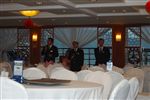 |
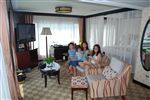 |
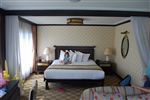 |
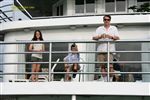 |
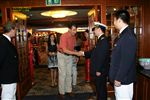 |
Most of the Victoria ships do a four-day cruise between Yichang and Chongqing. The Three Gorges Dam site and scenic area are the highlight of any Yangtze River cruise. However, we chose the 8-day cruise on the Victoria Prince, which goes a longer distance and adds more stops. This was our major trip of 2009, so we had the time and inclination for the longer trip.
Both the short and long cruises go in one direction only. We boarded in Shanghai on July 26, 2009. Although the boarding was supposed to start at 3:00 pm, the crew was happy to let us aboard when we arrived about an hour early. Employees dressed like gondoliers welcomed us and took our luggage directly to our room. Aboard, we were informed that upgrades were available. I found the prices reasonable, so we upgraded one of our two cabins. This was to be the girls' room, for my wife and two daughters, and my son and I took the small cabin. During the days, the large suite had plenty of room for all of us. 100% of the cabins have a balcony. The size of the cabins is comparable to those on a large cruise ship.
After we boarded, a band gathered to welcome the other passengers as they arrived. At every stop during the cruise, the staff would line up to welcome us back. At 4:00 pm, the ship 'set sail,' although there was no sail on the five-story vessel. At 5:30 pm, we had an orientation briefing. The safety portion was very brief. The cruise director said there had never been an accident on the ship and that it was impossible for the ship to sink (I'm pretty sure they said the same thing about the Titanic). However, in the unlikely event of something, we were told to just follow the instructions over the loudspeaker. At 6:45 pm, the captain had a welcome reception, which we missed, and at 7:30 pm, dinner was served.
Before I go further, all the meals, especially the dinners, aboard the ship were outstanding. For breakfast and lunch, a mixture of western and Chinese dishes were available on the buffet line. Except for the first night, the dinners were served Chinese style, meaning lots of dishes were put on a lazy Susan in the middle of a round table. The passengers could take as little or as much of anything they wished. They always put out way more food than we could possibly eat. It was challenging to stay disciplined and not overeat (I'm trying to keep my weight under 175). All the dinners were outstanding; it was some of the best Chinese food I have tasted. The food was more authentic than what you will get in most American Chinese restaurants but milder than what you might get in a Chinese restaurant catering to Chinese patrons. It was a delicate balance to find, but the chef found that happy medium.
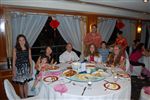 |
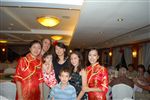 |
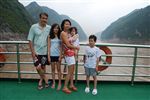 |
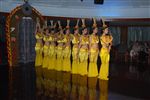 |
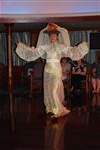 |
Day 2 featured a visit to Nanjing, a major Chinese city, and a temporary capital of China. We arrived in Nanjing at 12:30 pm and went by tour bus to the Dr. Sun Yat-Sen Mausoleum. Briefly, Dr. Sun Yat-Sen was instrumental in overthrowing the Qing Dynasty and the founding of the Republic of China in 1912. After his death in 1925, different factions broke out in the government, with Mao Zedong and the communist party winning a civil war in 1949. Today, Dr. Sun Yat-Sen's remains rest atop a large hill in a forested area of Nanjing. It requires climbing a lot of steps to reach his mausoleum, but that is part of the fun. The ceiling above his encasement features the emblem from the former flag of the Republic of China, which is still in use in the flag of Taiwan. It is the only place I have ever seen that emblem in five trips to China. If I'm not mistaken, Taiwan still calls itself the "Republic of China" and considers Dr. Sun Yat-Sen as its primary founder. I asked a friend from Taiwan to confirm this, but she wasn't sure.
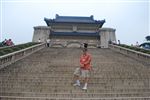 |
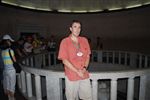 |
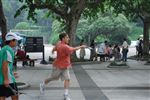 |
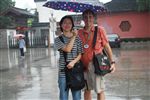 |
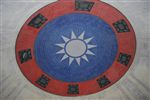 |
After climbing up and down the mountain, we had some time to spare, so I played tennis with somebody, using a tennis ball attached to a long rubber band with the other end tied to a heavy object. It was sweaty but fun. Afterwards, we went to the Qing Dynasty Bazaar. We had the choice of doing a tour of the Confucius Temple or just shopping in the many stalls. Normally I hate shopping, but in this venue it was fun, and everything was comparatively cheap to the US. I found lots of memorabilia of my hero Lei Feng, including a satchel, which you'll see in some pictures of me from that point forward. This was a good mixture of an organized activity with some free time to do as we pleased. At 6:00, we returned back to the ship. We had a wonderful dinner at 7:00.
Day 3 was Yellow Mountain day, or Huang Shan, as it is called in Chinese. A visit here was a major reason why we choose to take the long cruise, rather than the short one, which doesn't make this stop. I visited Huang Shan in 1994 for three days, and I found it to be one of the best destination choices I ever made in China. Briefly, Huang Shan in a scenic area featuring steep mountains covered in mist. Walking trails, some of them extremely steep, allow tourists to see one of the most beautiful parts of China and get some exercise at the same time. However, I didn't realize that it was a 2.5-hour bus trip each way from the ship, leaving only about 5 hours at the destination. From my previous visit, I recalled the road leading there to be extremely narrow and windy. My family is very prone to motion sickness, as I discuss in my blog about our Spring Break in San Felipe. It was also raining at the ship, which I thought might mean the rain would be worse up in the mountains. So we wimped out and stayed on the ship. During the day, we took a public bus into the town of Guichi, where we poked around and hired a taxi driver to show us around.
In small towns like Guichi, Westerners will encounter what I find to be the most annoying thing about China. Lots of the locals will call out anonymously from a distance "heeeeeellllllloooooo!?" The way they say it sounds like the way Squiggy did on Laverne & Shirley. If you're too young (or old) to appreciate the reference, it is the way one might say it at a pet store or zoo if trying to communicate with a parrot. You may think they are just being polite, but I strongly feel they do it in a mocking manner. Like how people yell "moooo!" to cows from a passing car window. In tourist sites that have lots of stalls, the shopkeepers do this sometimes too, but I don't think they realize my sore feelings on the topic. It is probably the only word in English they know. The more small and rural the town, the worse this problem is.
Day 4 was Wuhan Day. Most of the day was spent aboard the ship, because we didn't set foot in the city until after dinner. During such times on the boat, there was usually some kind of class or lecture going on. For example on that day, there was Tai Chi, a lecture on Chinese medicine, a lecture on engraving & stonecutting, a lecture on Chinese painting, afternoon tea, and a lecture on bottle painting. Not every day was so focused on art. Others had more of an emphasis on history or geography. All we had time for in Wuhan was a visit to the Rare Stone Museum, which may have been the only museum in Wuhan open that late. Never in my life have I seen a collection of stones to compare. Many were taller than me, in magnificent shapes and colors. The highlight was a big table covered with collections of stones that look like food. You could tell whoever created the place really loved it.
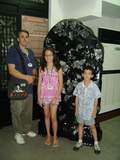 |
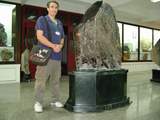 |
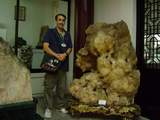 |
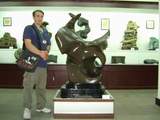 |
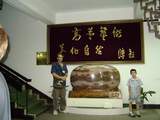 |
Day 5 was the only day entirely on the river. If you do this cruise going downstream, they do it seven days, skipping this day. Like the previous day, there was usually some kind of planned activity. If that didn't interest you, the ship had a combined beauty salon/massage parlor, a small exercise room, a large lounge with a bar and four computers with extremely slow Internet, some shopping in the lobby, and plenty of public seating on the roof of the ship. The evening entertainment was the "Minorities Show," which featured lots of costumes from non-Han Chinese.
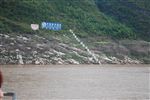 |
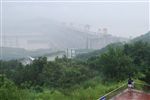 |
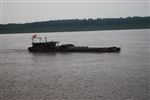 |
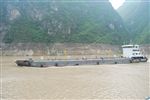 |
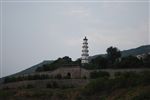 |
Day 6 was Three Gorges Dam day. As you may know, the Three Gorges Dam is by area the largest dam on earth, but neither the longest nor highest. The highest is Hoover Dam (yeah!). Before arriving at the dam, we went through Xiling Gorge, the first of the three gorges that make up Three Gorges. At 1:45 pm, we went on an excursion to the dam site to have various looks at it from above. Unlike Hoover Dam, they don't let you walk on it, which can be forgiven because the dam is still unfinished. Our guide that day was Susan, who spoke perfect English and broke with her script at times to tell jokes or offer trivia. In five trips to China, she is the best guide I have ever had. We spoke one on one about movies a little bit. She is a big Will Smith fan. I told her how much I liked the movie "I am Legend," but she said it was too scary for her, so she left the theater half way through. She challenged me on my knowledge of Chinese movies. I was embarrassed to say that my knowledge of Chinese movies pretty much begins and ends with Gong Li. That evening was the magic show. I had meant to meet with the magician one on one later for private lessons, but I never got around to arranging anything.
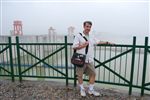 |
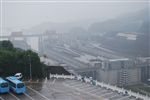 |
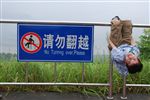 |
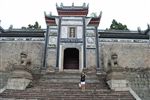 |
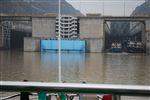 |
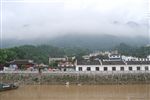 |
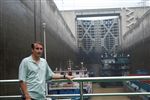 |
Day 7 was Wushan day. First we went through Wu Gorge, the second of the three gorges. After lunch, we arrived in the city of Wushan, and we went almost directly from our cruise ship to a smaller boat, which went up the Daning River, a tributary of the Yangtze. When the river narrowed to a certain point, we got onto even smaller boats. Steep cliffs, monkeys, and "hanging coffins" marked this trip. Hanging coffins can be found in caves on extremely steep cliffs. I think the term is a misnomer, because the coffins don't hang, they just sit there in a cave. They were placed there many years ago. Aaron, our river guide, said it is a mystery to this day how they got them there. It certainly puzzled me, as they were hundreds of feet up sheer cliffs. My best guess is they used the same kind of mountaineering skills and gear people use every day to ascend the vertical cliffs at Red Rock, just outside of Vegas. I imagine they lugged up the coffin, and perhaps the body, in pieces over multiple trips before assembling it in the cave. It may sound very labor-intensive, but these are the same people who built the Great Wall of China.
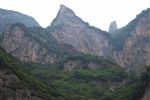 |
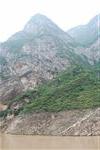 |
 |
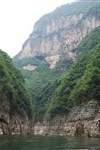 |
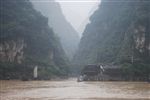 |
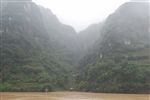 |
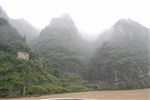 |
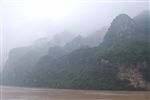 |
At 5:25 pm, we went through Qutang Gorge, the third of the three gorges. This is the shortest, but the sweetest, of the three gorges. The back of the Chinese 10 RMB bill depicts an image from this section. During the evening, there was a Cabaret show, during which the passengers were invited to contribute. I volunteered to do stand-up comedy. I told the cruise director specifically how to introduce me, because it led into my first bit. However, the river guide ended up being the MC, and my introduction was "Here is Michael to do something." The cruise director warned me that our group of passengers had no sense of humor at all, and he was right. Most of the people that chose to attend were elderly, many of who may not have spoken English well. I don't think I have bombed so badly since my 2005 season NFL picks.
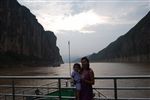 |
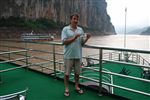 |
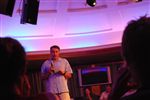 |
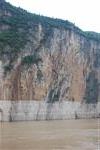 |
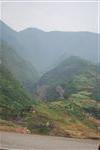 |
Day 8 was Fengdu Day. According to Chinese legend, Fengdu is where you must pass through after you die to face judgment, before beginning your next life, going to hell, or whatever happens next. It's kind of like the Chinese version of purgatory. If this is where you go after you die, God is indeed a wrathful and vindictive one. The place they took us was a nice scenic mountain that had been turned into a tourist trap, at least in my opinion. First, a long line of souvenir stalls greets you, each selling the same stuff, most with some people bellowing out "hello" as you walked by. Then you have the choice to take a ski lift or stairs up to the top of the mountain. I chose the stairs, of course. People pay good money to walk on boring stair machines back home. At the top of the mountain were hoards of tourists in cramped spaces. There were supposed to be three tests of hell, but in all the crowds we lost our tour guide, and we only found one of the tests. It involved balancing for three seconds on a round stone. If you can complete the test, it signifies you led a virtuous previous life. It was pretty easy to go the three seconds; about 90% were successful, including me. If that were the true test, god is not being picky enough. In all fairness to my sour review of Fengdu, it was pouring rain, and I had to lug around a 3-year old kid, which may be contributing factors to why I'm so jaded. That evening was the captain's farewell banquet, where we were instructed about the "Tipping Guideline." I will copy and paste below the instructions placed in our cabin.

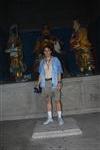 |
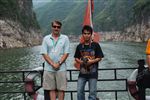 |
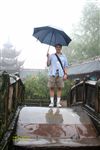 |
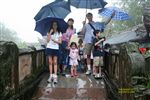 |
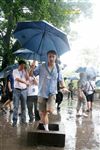 |
Whenever there is ambiguity about how much to tip, you can bet that my wife and I will argue extensively about it, and this was no exception. At least they gave us a guide. At the Family Vacation Center, where we went the last two years, there was no guideline at all, just a box in the lobby and a reminder that the staff was mostly poor college students who depend on your tips.
My wife strongly believed that tipping is not customary in China and that the Chinese passengers wouldn't tip, effectively causing the other passengers to subsidize them. At Norwegian Cruises, they set aside a certain percentage of the ticket price, I think 10%, as a service fee, and they only shake you down for the ma'tre'd, who is not part of the tip pool for some reason. While that eliminates the guessing game, it also eliminates the motivation to provide good service.
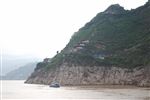 |
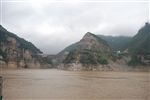 |
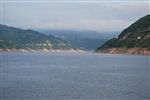 |
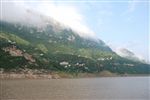 |
With the tipping guideline on this cruise, they provided two envelopes, with a line for "from," and indicated that the tip dropbox was in the lobby. At the farewell banquet, it was also said that tipping directly to particular staff members was allowed. It was also said that the river guide was not part of the tip pool and could be tipped directly. My wife wanted to take the 10% and give it directly to the staff members we interacted with and stiff everybody else. However, I argued that her idea ignored the employees behind the scenes, like the guys in the engine room. Her response was that those kinds of employees do not expect tips, even back home. That entire evening and the following morning we argued about it. In retrospect, I should have agreed to her idea of tipping 10% only to the faces we knew, and secretly put another 10% in the tip box. It would have been a cheap price to pay to avoid the stress of the argument.
During the final breakfast, and while getting ready to leave, we saw envelopes and cash being distributed seemingly effortlessly by other passengers. This appeared to have caused a change of heart in my wife. She basically said that I could tip as much as I wanted to whomever I wanted, and she didn't want to know anything about it. However, by that time, we had already passed out our tips that were closer to what she wanted to do, and we had used up our envelopes. It was too late to change our minds, and a bad way to end the cruise.
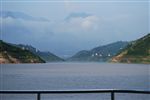 |
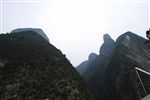 |
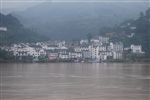 |
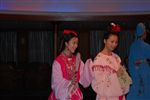 |
Overall, I was very pleased with the cruise. If Victoria Cruises did cruises elsewhere in China, I would be happy to do another one. It was a very safe, comfortable, and easy way to see the country. On the other hand, you never have the chance to get your hands dirty interacting with regular Chinese people. If that is what you want, I would suggest adding time on either end of the cruise in a major Chinese city. Most of the passengers did that anyway, some brushing up against the 30-day maximum allowed stay per visa. I've had great fun doing magic tricks and playing chess on the streets in China. If you get off the beaten tourist path a bit, China can be great fun. It can also be frustrating and confusing, which makes the cruise experience a pleasant relief. If you do split up a trip, I would recommend doing the cruise last. As with my casino reviews, let me end with my suggestions for improvement.
I know there were not many children on board, but it would be nice to have some activities for them.
Almost every night the program said there would be karaoke in the lounge, but I never once saw anybody singing, and it wasn't clear how to get started. Perhaps someone on the staff should get the ball rolling by singing first.
The recommended tip of 550 RMB per passenger should have just been added to the price of the cruise. A gratuity is supposed to be gratuitous, by definition. In China, tipping is not customary, so this hit us by surprise. I have no problem with tipping people individually for going beyond the call of duty.
If there is any alternative to ghost hill in Fengdu, please consider it. They may not have a choice, as the Lonely Planet guide to China says Fengdu will be inundated once the dam is finished.
It would be nice to have more free time on shore to explore individually. They only time this happened was about one hour in Nanjing.
Flirting with the girls on staff was great fun. It would be enjoyable if they had some time set aside to go to the lounge and just mingle with the passengers.
How about a ping-pong table somewhere? It is China after all.
Finally, I offered the cruise director a chance to review this for accuracy before I published it. However, I lost his business card, and my attempts to reach him through the Victoria web site have gone unanswered. I still welcome his comments, should he find this.




